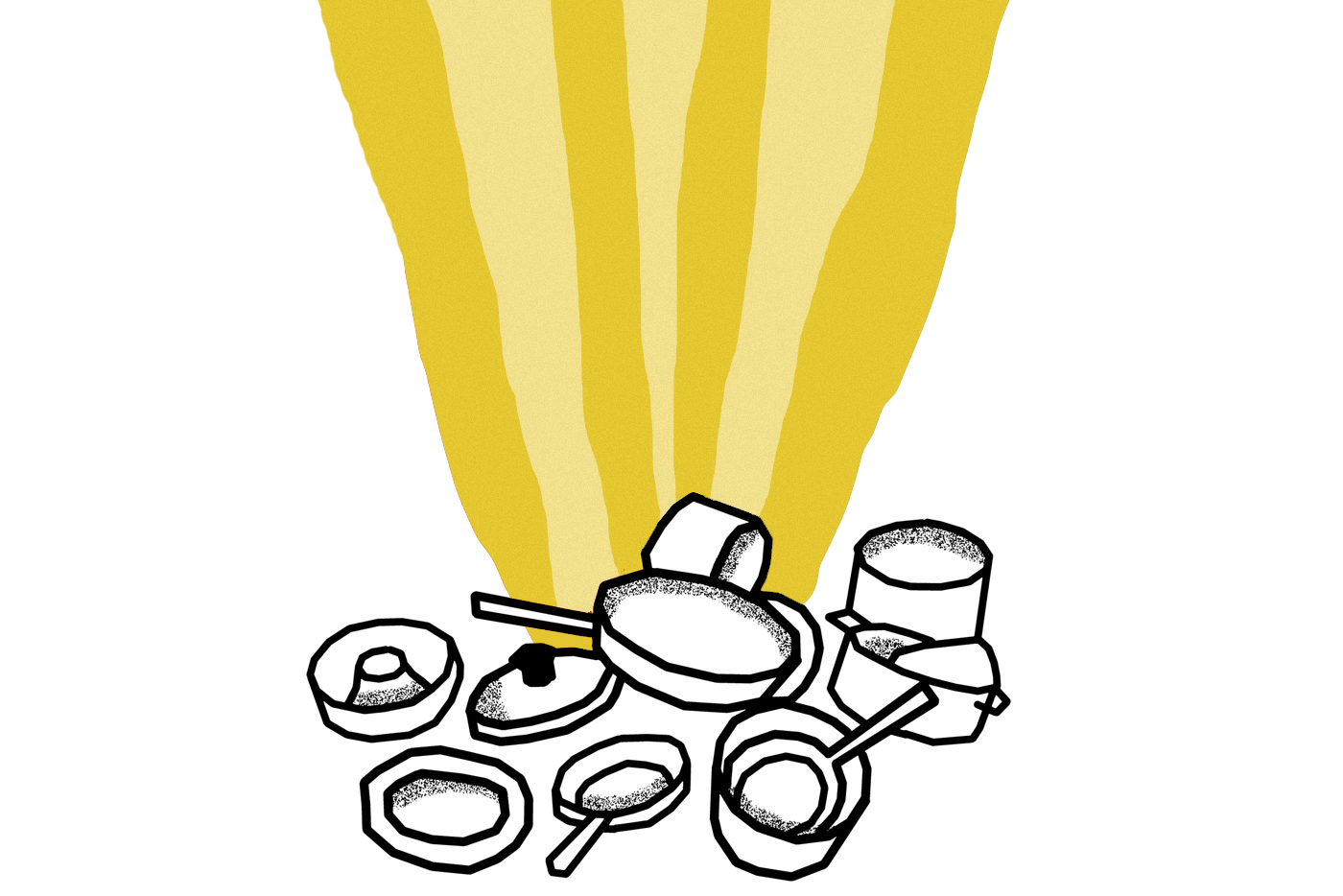Raquel Carena, the Mère of Belleville
On a rainy afternoon in Belleville, the worn working-class neighborhood in northeastern Paris where tourists come to gape at the small plaque on the façade of the house on the steep street where Edith Piaf was born 1915, there’s a softly fruity and bracingly vinegar-edged smell of cooking in the air when I step through the front door of Le Baratin. In the middle of the afternoon, the bar at the entrance to this little bistro, now one of the city’s most famous restaurants, is quiet, and there’s a radio playing somewhere.
So no one hears me when I come in, including the pensive looking woman seated at a table in the back of the room. Her salt-and-pepper hair is pulled back in a loose pencil-secured chignon, and she’s writing so intently in the notebook spread on the table in front of her that she’s become oblivious to what’s going on in the restaurant.
I start towards her, but then I pause, reluctant to break her spell and suddenly curious to observe her for a minute or two before we begin the conversation I’ve come for. It’s not really fair to sneak up on someone this way, but on the other hand, so much is revealed by the guileless posture of another person’s solitude.
Raquel Carena is a handsome woman with a fineness to her features that immediately reveals her sensitivity. Her face is full of puckish curiosity and intelligence, with a subtext that’s alternately mischievous and wistful. It has the natural dignity of a Daumier etching, the noble soulfulness of a Zurburan painting. It’s easy to imagine her as a restive teacher’s pet in a neatly ironed pinafore with her leather-strapped schoolbooks covered in Kraft paper in the front row of what was probably a Catholic girl’s school in a small provincial Argentine city, a place where the Loire Valley-like lushness of the surrounding countryside taunted the strict social conservatism of a Sixties childhood in a country where there was an ugly cloud of military brutality gathering on the horizon.
Every chef cooks from the country within his or her head where their culinary imagination was born, or that place where taste was first embroidered onto memory. It might be a briny Breton fishing port, a house on stilts in a bayou filled with croaking frogs, or a Manhattan apartment with a hissing radiator and a permanent scent of singed dust. But the sights, sounds, smells, and tastes of the personal primeval always inform a chef’s cooking to some degree or another. And this is why I’ve always wanted to try and draw Raquel out a little more about her past. And yet, because I not only respect her but also like her, I’d never insist so much that she’d lose her balance while navigating remembered rapids known to her alone. No, with her, I’ll just ask a question and listen, since she’s talented storyteller with an astute sense of narrative rhythm and a chef’s understanding of the power of detail, when used with restraint.
So I clear my throat, and she looks up, startled and alert, and composes herself with a smile even before she knows who I am. “I know you,” she says, stubbing out the cigarette that was sending a faint blue corkscrew of smoke into the air beside her. To make sure she does, I apologize again for the bunch of cooks from the now-shuttered Gourmet magazine who ran rough shod through her kitchen for a day five years ago after I’d finally persuaded the travel editor that there was more to Paris than Saint-Germain-des-Pres. Raquel had agreed to spend a morning with the cooks, but insisted they be gone by 11amm so that she could prepare for lunch. They stayed almost the entire day.
Because she hasn’t contrived a public persona that’s distinct from her private self, like most well-known Paris chefs do, I accept her offer of a coffee, which allows her to situate herself comfortably as my hostess. I also begin our chat by mentioning how astonished I am by the way that Belleville, where she’s spent most of her adult life, is gentrifying so quickly and visibly. She shakes her head. “Thirty years ago, there was an atmosphere up here that was très quartier (very neighborhoody). We all knew each other. It was very sweet. After the restaurant closed, we’d roll down the shutters and have a party. Everyone came, everyone bought a bottle, there was decent wine for 4 Francs in those days. Our lives were about conviviality, telling stories, chatting, exchanging ideas,” she says.
“Now the world is changing. Look at what’s happened up the street. Le Caire, the little grocery store where I bought coral lentils from a nice Egyptian man for years, is going out of business, and just across the street a slick organic grocery shop has opened where the same lentils cost twice as much and the staff don’t remember you from one day to the next. Paris is becoming more and more antiseptic, a colder and mannered city for the wealthy,” she says sadly.
For Carena, the rapidly fading bohemian Eden of Belleville, which of course existed side-by-side with a rough-and-tumble version of the same quartier where many of those who once lived there were very poor, is very personal. This community where she’s made her home—she lives in a house just a few steps from Le Baratin, and built her brilliant career as a cook—she’d never want anyone to call her a chef, through hard work and happenstance, once so lively, free and artistic, or so very much at odds with Cordoba, her Argentine hometown, is slowly but surely threatening to become the sort of mannered bourgeois place she so purposefully refused.
Even if she might not have set foot in a church in many years—I don’t know for sure, it’s not the kind of question I’d ask someone with a maze-like personality as interesting as Carena’s—there is about her a poignantly lingering smell of wax tapers just snuffed out in a cold stone cathedral. What this tells is that for all of her one-of-the-guys bluffing with the trendiest young chefs in Paris, she’s a woman of rectitude, self-discipline, and also someone whose reflexive warmth and friendliness issues from a deep font of gentleness and humility that’s protected by an innate reserve and an aversion to the relentless self-promotion encouraged by contemporary culture everywhere.
As someone who’s been intermittently working on a mosaic of her life for a long time, my hunch is that she might have been hoping to resolve a certain defining conundrum of the provincial naughtiness attached to a free female sensuality when she went to Mexico City at the age of eighteen and found work at a publishing company. And as I’ve gradually assembled a clearer idea of her life piece by piece over the years—Raquel isn’t much interested in telling her own story, preferring spiraling anecdotes to any tidy exposition of her past—the epoch I like best is this sudden, stark moment of personal freedom in another heaving Spanish speaking metropolis. Here she would suddenly be respected for her formidable linguistic skills and literary judgment and inevitably found irresistible as the peppery little Argentine woman with the educated accent of the country other Latin Americans once grudgingly respected for its wealth at the same time they found its inhabitants woefully stuffy and offensive for their pose as a European nation accidentally located in South America. Colorful, chaotic, and passionate, Mexico City must have been a delicious tonic for Carena coming from austere Córdoba.
After Mexico, she went to Italy, and then Paris. “I followed a boy,” she says with a chuckle. That relationship sputtered but she liked the city and decided to buy an abandoned bistro “for nothing, really nothing, it was falling down” at 3 rue Jouye-Rouve. She and Olivier Camus, her partner at the time, rolled up their sleeves to renovate the beaten up space themselves. Their idea was to create a simple little bistrot à vins that would serve the natural and organic wines that Camus, a vinophile, championed with simple plates of cheese and charcuterie. Raquel had never cooked before.
“The moment I started cooking, it became my passion,” Carena explains. “I bought a copy of La Cuisine du Marché by Paul Bocuse, and I cooked my way through it. In fact, I almost memorized it—it was my bedside book for years. I taught myself the history of French cooking, because you have to know how to do everything before you can really call yourself a cook.” If her cooking has a signature beyond its exuberant sincerity, it might be the culinary warp and woof of sweet and sour flavors from the Moorish kitchen that the Spanish carried across the Atlantic and deep into the heart of a vast fertile country where fire remains the primary cooking technique. An example? The red-tuna-and-black-cherry tartare I ate the first time I went to Le Baratin and will never forget for its spectacular mixture of fleshy textures and the racing contrast of the velvety, iodine-rich fish with the sweet juicy fruit. A pinch of Maldon salt pulled the whole dish together.
Since Le Baratin opened in 1987, its reputation has grown far beyond the original cozy group of regulars who fell in love with Raquel and her cooking and the excellent list of organic and natural wines that’s run by Philippe Pinoteau, aka “Pinuche,” who’s been Raquel’s partner since 1992.
Not only has this miniscule restaurant achieved cult status as a clubby favorite of chefs, winemakers, food writers, and people associated with the food industry, but heavy media coverage has landed it in magazines and guidebooks around the world. It recently figured in a segment about Paris shot by the itinerant gastronome Anthony Bourdain.
The fame is not entirely welcome, since it’s spoiled the original fun of running a hangout for friends to now be packed day-in-and-day-out with English-speakers who find Belleville fearful and ask for taxis home, to the easily understood exasperation of ‘Pinuche’ (Just for the record, Belleville is perfectly safe). Though Raquel is shyly proud that her cooking has won such renown—after all, Le Baratin has become a sort of 21st century version of L’Ami Louis—her deeply reflexive good manners and honest affection for and curiosity about other people mean that what she really thinks about the unexpected turn her life has taken is something she’d only share with Pinuche, or maybe Iñaki, but no one else. I suspect it amuses, bewilders, pleases, and exhausts her in equal measure.
Does her success surprise her? She drops her eyes and buys some time to compose her thoughts by lighting a cigarette. “The Argentines are the best grill chefs in the world,” says Carena, deflecting the personal question with a rare unguarded and fleeting expression of nostalgia for the country where she was born fifty-six years ago. “But the real mastery of cooking comes from having a very light hand and only gently heating produce when it’s necessary. It’s knowing how to preserve the moisture in food that’s at the heart of all good cooking,” Carena says. “Water makes food digestible, and you have to know how to get the best out of a vegetable, a meat or a fish by keeping it moist,” she says with conviction, adding, “The cook should be kept moist, too, but of course that’s best done with wine.” It’s almost as if Carena has some sort of sensor in her head that instantly triggers a burst of gentle auto-derision the moment she hears herself sounding too serious, and it’s just one of the many reasons she’s charming.
In the French press, Carena is often described with the sobriquet “La Mère de Belleville,” (the mother of Belleville), because despite the fact that she has no children of her own, she’s perceived of as eminently maternal and also because “Mère” is an old-fashioned term for a female chef. It’s true, too, that she’s adored by such testosterone-riddled personalities as pastry chef Pierre Hermé or bistrotier Yves Camdeborde, but for my part, I trust the affectionate acuity of a more sensitive crew of cooks who look to her more as an adored older sister than a mother. This is not only because the sister label doesn’t abnegate Carena’s gentle sensuality, but also because the cooking style of the chefs she’s closest to, Olivier Roellinger and Iñaki Aizpitarte of Le Chateaubriand, for example, is nearer to her own.
The peach-and-tomato gazpacho or Tandoori paste-stuffed steamed chicken breast with herbs and fresh corn that Iñaki was serving when I first discovered his cooking at La Famille, the restaurant in Montmartre where he debuted in Paris, displays the same culinary logic often found in Carena’s creations—intriguing tones of sweet-and-sour, an impeccable technique and a love of the whole spectrum of umami, punctuated by base notes of smoke, salt, and pepper. If Carena babies Aizpitarte, Roellinger, with whom she shares a love of spices and typically Breton dishes that combine terre et mer (meat and seafood) is a chef she breathlessly admires. “Olivier’s food is exquisite,” she says, adding that in Paris she very rarely goes to restaurants. “I don’t have the time, and when I’m not working, I like to be at home in my little garden listening to opera and reading. But when I do go out, I love to eat Iñaki’s food,” she says.
“Sometimes I get into the mood to cook Argentine food, too—dishes like locro, a soup of hominy, pork belly, chorizo and garlic, or a carbonada, which is a pumpkin filled with layers of meat, regular potatoes, and sweet potatoes, corn on the cob, carrots, peppers, onions and bacon topped with dried peaches or apricots. The stew cooks in the pumpkin and you need a very firm pumpkin for this to work.”
When I tell Raquel that I’d love to try both of these dishes, she nods enthusiastically, “Okay! Okay! Maybe the next time you come, I’ll make one of them for you,” which is hardly an idle suggestion, since she’s known to scan the reservation book before deciding on her daily menu. “I promise I will!” she says, and now it’s my turn to be startled by someone clearing their throat—Pinuche must have come into the room on cats paws. With a smile, he points at his watch and I glance at mine.
I’ve been almost as thoughtless as my former Gourmet colleagues, promising I’d only keep her for an hour and then blithely letting three go by. So a final question: What would you like to do in the future? Carena frowns briefly. “My pleasure is cooking for other people. It’s what makes me happy and what I will continue to do.” I put on my coat, kiss her on both cheeks, and apologize again for plundering her afternoon. Just before I get to the front door, she calls my name, in French. “Alexandre, I might make you locro before I make you a carbonada. Locro tastes best in the autumn, but don’t wait until then to come back,” she says and vanishes into the kitchen, leaving me deeply well-nourished but wanting more as she always does.
Le Baratin, 3 rue Jouye-Rouve, 20th Arrondissement, Paris. Tél. (33) 01-43-49-39-70.




